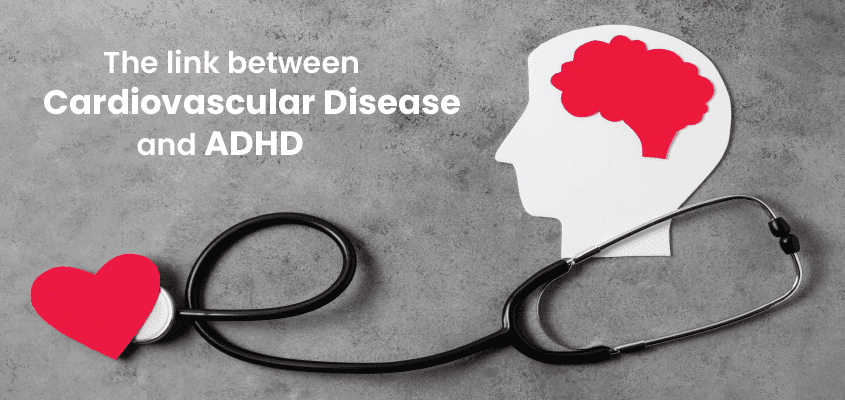Introduction
ADHD, or attention-deficit hyperactivity disorder, may be a risk factor for cardiovascular disease in adults. However, there has been little research on the potential connection between the disorder and the risk of cardiovascular disease. Though physicians have long identified that some psychiatric conditions can raise the risk of cardiovascular disease, the study is still in its nascent stage. A team of researchers from Sweden’s Karolinska Institutet and Orebro University has evaluated that risk in a study [1] published in the World Psychiatry Journal.Adults with ADHD are at a higher risk of cardiovascular disease than those without ADHD.[5] It is unknown if this is due to them being more likely to be diagnosed with ADHD or simply the fact that they are at an increased risk of cardiovascular diseases as they age.
The link between heart disease and ADHD
While all cardiac diagnoses were more prevalent in individuals with ADHD, there are exceptionally high chances of cardiopulmonary arrest, brain haemorrhage, and peripheral arterial disease. Additionally, the risk factor increased for those taking stimulant medications for their ADHD. It is well-known that some stimulant treatments raise blood pressure and heart rate, both risk factors for heart disease. It may be the contributing factor to the link. However, studies still do not fully explain the elevated risk. Additionally, those not taking those medications were still more likely to develop cardiovascular disease. It is the same for people with ADHD. People who took psychiatric drugs other than stimulants and those who did not were still more likely to develop cardiovascular diseases. Moreover, a higher rate of cardiovascular disease diagnoses occurred in the group of people with ADHD merged with several other psychiatric conditions, such as eating disorders and substance abuse, than in the group with ADHD alone. [2] Although the link between ADHD and cardiovascular disease is complicated, it may stem from the emotional trauma caused by the disorder. This trauma can often lead to long-term amphetamine use and behaviours like increased smoking. [3] Another interesting fact is while the risk of cardiovascular disease rises with age, the severity of the main symptoms of ADHD tends to decrease.
The connection between ADHD and cardiovascular disease
Comorbidities in psychiatry, particularly for eating and substance use disorders, may contribute to the correlation between ADHD and heart disorders. However, researchers lack specific data on lifestyle factors contributing to the higher risk of cardiovascular disease in adults with ADHD, such as smoking and physical activity. Further investigation is required to determine whether genetic factors may contribute to the association [3] .
A recent study of ADHD and cardiovascular disease
The recently published study by the Swedish universities is one of the few such studies on the relationship between ADHD and cardiovascular diseases, even though doctors and scientists have long known that there is a connection between mental disorders and cardiovascular diseases. Here is a closer look at the implications:
Researchers found that 38% of people with ADHD had at least one prognosis of coronary heart disease, compared to 24% of those without ADHD. [4] The findings indicate a marked link between ADHD to a higher risk of developing cardiovascular disease. Cardiologist Dr Benjamin Hirsh of Northwell Health in Great Neck, New York, has explained that since diagnosis rates have only exponentially increased in the past 45 years, it has been challenging to establish a connection between ADHD and heart disease. Coronary disease is developing at an accelerated rate in people over 45.The researchers discovered that people with ADHD were more likely to have cardiovascular risk factors such as heavy smoking, obesity, diabetes, sleep issues, lower levels of education, and psychiatric conditions. However, adjusting for these cardiovascular risk factors had little effect on the relationship between the risk of cardiovascular diseases and ADHD.Additionally, excluding people with ADHD who were also taking medication for their condition or another mental illness did not affect how strongly the risk of cardiovascular disease was associated with their situation. These findings imply that ADHD may be a risk factor for cardiovascular disease, even without other cardiovascular risk factors like obesity, smoking, and comorbid psychiatric conditions.While conducting further analysis, the researchers discovered that people with ADHD and co-occurring psychiatric disorders such as eating disorders and substance use disorders had a higher risk of cardiovascular disease than people with only ADHD.
Preventing cardiovascular disease among individuals with ADHD
Although caution is still required when using stimulants, treating ADHD effectively and responsibly is essential to improving a person’s quality of life at any age and their health throughout their lifetime. However, for the time being, one of the key conclusions from the Swedish study is that people with ADHD should consult their physician or cardiologist.Healthcare professionals must also carefully consider mental health comorbidity and lifestyle factors to decrease the risk of cardiovascular disease in ADHD patients. Maintaining a healthy lifestyle, which includes mental health, a nutritious diet, managing stress, getting enough sleep, and exercising frequently, is another critical factor in preventing and treating cardiovascular disease.
Conclusion
People with ADHD have a higher risk of developing certain cardiovascular diseases, arteriosclerosis, stroke, cardiogenic shock, arrhythmias, and heart failure. Understanding the relationships between cardiovascular disease and ADHD is crucial because the prevention and treatment methods can differ. Moreover, it is unclear to what extent ADHD affects a person’s risk of developing cardiovascular disease.
References
- J. Anderer, “Adults with ADHD more than twice as likely to develop heart disease,” Studyfinds.org, 16-Sep-2022. [Online]. Available: https://studyfinds.org/adult-adhd-heart-disease/. [Accessed: 13-Mar-2023].
- L. A. Habel et al., “ADHD medications and risk of serious cardiovascular events in young and middle-aged adults,” JAMA, vol. 306, no. 24, pp. 2673–2683, 2011.
- S. Weissenberger et al., “ADHD, lifestyles and comorbidities: A call for a holistic perspective – from medical to societal intervening factors,” Front. Psychol., vol. 8, p. 454, 2017.
- Karolinska Institutet, “Adult ADHD linked to elevated risk of cardiovascular diseases,” Science Daily, 15-Sep-2022.
- M. W. Wachsman, “Study: Cardiovascular disease twice as likely in adults with ADHD,” ADDitude, 13-Nov-2022. [Online]. Available: https://www.additudemag.com/cardiovascular-disease-adhd-adults-study/. [Accessed: 13-Mar-2023].










